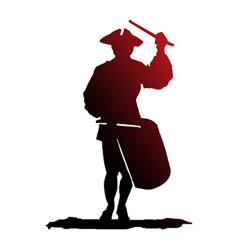| JUNE/JULY/AUGUST 2007 – NO. 16 |

The Revolutionary War
1775—1783
Memoir.
November 25th, 1783 — The British army evacuated New York, and the American troops under General Knox, took possession of the city. Soon after, General Washington and Governor Clinton, with their suite, made their public entry into the city on horseback, followed by the lieutenant governor and the members of council, for the temporary government of the southern district, four abreast. General Knox and the officers of army, eight abreast; citizens on horseback, eight abreast; the speaker of the assembly and citizens on foot, eight abreast. The governor gave a public dinner, at which the Commander in Chief, and other general officers were present. The arrangements for the whole business were so well made and executed, that the most admirable tranquility succeeded through the day and night. On Monday the governor gave an elegant entertainment to the French ambassador, the Chevalier de la Luzerne; General Washington, the principal officers of New York state, and of the army, and upwards of a hundred gentlemen were present. Magnificent fireworks, infinitely exceeding every thing of the kind before seen in the United States, were exhibited at the Bowling Green in Broadway, on the evening of Tuesday, in celebration of the definitive treaty of peace. They commenced by a dove descending with the olive branch, and setting fire to a marron battery. On Tuesday noon, December 4th, the principal officers of the army assembled at Francis' tavern, to take a final leave of their much loved Commander in Chief. Soon after his Excellency entered the room. His emotions were too strong to be concealed. Filling a glass, he turned to them and said, "With a heart full of love and gratitude, I now take leave of you. I most devoutly wish that your latter days may be as prosperous and happy as your former ones have been glorious and honorable." Having drank, he added, "I cannot come to each of you to take my leave, but shall be obliged to you, if each of you will come and take me by the hand." General Knox being nearest, turned to him. Incapable of utterance, Washington, in tears, grasped his hand, embraced and kissed him. In the same affectionate manner he took leave of each succeeding officer. In every eye was the tear of dignified sensibility; and not a word was articulated to interrupt the eloquent silence, and tenderness of the scene. Leaving the room, he passed through the corps of light infantry, and walked to White Hall, where a barge waited to convey him to Paulus' Hook. The whole company followed in mute and solemn procession, with dejected countenances, testifying feelings of delicious melancholy which no language can describe. Having entered the barge, he turned to the company, and waving his hat, bid them a silent adieu. They paid him the same affectionate compliment, and after the barge left them, returned in the same solemn manner to the place where they assembled. The passions of human nature were never more tenderly agitated than in this interesting and distressful scene.
General Washington now repaired to Annapolis, where Congress were in session, to whom he resigned his commission, which, eight years before, he had received from this honorable body. On the 23rd of December, the day appointed for the very interesting transaction, a vast concurrence of spectators attended. The gallery was filled with a group of ladies, and some graced the floor of Congress. The governor, council and legislature of Maryland, several general officers, the consul general of France, and numerous citizens of Annapolis were present. Congress were seated and covered, as representatives of the sovereignty of the union; the spectators were uncovered and standing. The general was introduced to a chair by a secretary, who, after a decent interval ordered silence, a short pause ensued, when the honorable Thomas Mifflin, the president, informed the general that "the United States in Congress assembled were prepared to receive his communications." On which he rose with dignity, and delivered this address:
"Mr. President,—The great events on which my resignation depended, having at length taken place, I now have the honor of offering my sincere congratulations to Congress, and of presenting myself before them, to surrender into their hands, the trust committed to me, and to claim the indulgence of retiring from the service of my country.
"Happy in the confirmation of our independence and sovereignty, and pleased with the opportunity afforded the United States, of becoming a respectable nation, I resign with satisfaction the appointment I accepted with diffidence; a diffidence in my abilities, to accomplish so arduous a task, which, however, was superseded, by a confidence in the rectitude of our cause, the support of the supreme power of the union, and the patronage of Heaven.
"The successful termination of the war has verified the most sanguine expectations,—my gratitude for the interpositions of Providence, and the assistance I have received from my countrymen, increase with every review off the momentous contest.
"While I respect my obligations to the army in general, I should do injustice to my own feelings, not to acknowledge in this place, the peculiar services and distinguished merits of the persons, who have been attached to my person during the war. It was impossible the choice of confidential officers, to compose my family, should have been more fortunate. Permit me, Sir, to recommend in particular, those who have continued in the service to the present moment, as worthy of the favorable notice and patronage of Congress.
"In consider it as an indispensable duty to close this last solemn act of my official life, by commending the interests of our dearest country, to the protection of Almighty God, and those who have the superintendence of them to his holy keeping.
"Having now finished the work assigned me, I retire from the great theatre of action; and bidding an affectionate farewell to this august body, under whose orders I have long acted, I here offer my commission, and take my leave of all the employments of public life"
This address being ended, General Washington advanced and delivered his commission into the hands of the President of Congress, who replied as follows:
"The United States in Congress assembled, receive with emotions too affecting for utterance, the solemn resignation of the authorities under which you have led their troops with success, though a perilous and doubtful war.
"Called on by your country to defend its invaded rights, you accepted the sacred charge before it had formed alliances, and whilst it was without friends or a government to support you.
"You have conducted the great military contest with wisdom and fortitude, invariably regarding the rights of the civil power, through all disasters and changes. You have by the love an confidence of your fellow citizens, enabled them to display their martial genius, and transmit their fame to posterity; you have persevered till these United States, aided by a magnanimous king and nation have been enabled under a just Providence, to close the war in safety, freedom, and independency; on which happy event we sincerely join you in congratulations.
"Having defended the standard of liberty in this new world; having taught a lesson useful to those who inflict, and to those who feel oppression, you retire from the great theatre of action, with the blessings of your fellow citizens; but the glory of your virtues will not terminate with your military command, it will continue to animate remotest ages. We feel with you, our obligations to the army in general, and will particularly charge ourselves, with the interest of those confidential officers, who have attended your person to this affecting moment.
"We join you in commending the interests of our dearest country to the protection of Almighty God, beseeching him to dispose the hearts and minds of its citizens to improve the opportunity afforded them of becoming a happy and respectable nation; and for you we address to Him our earnest prayers, that a life so beloved, may be fostered with all his care; that your days may be happy, as they have been illustrious, and that he will finally give you that reward, which this world cannot give."
It impossible to conceive that greater honor can be conferred on any man, than to receive the united acknowledgments of three millions of people, assembled by their representatives, declaring to all the world, that he has been the temporal savior of his country! His mind was powerful and enlightened, his devotion to his country fervent, his sacrifices great and important, and his triumphs noble and splendid; and his memory will be blessed and immortal!
It has been estimated, that the loss of lives in the various armies of the United States, during the war, is not less than seventy thousand. The numbers who died on board of the horrid prison ships of the enemy, cannot be calculated. It is, however, confidently asserted, that no less than eleven thousand of our brace soldiers, died on board the one called the Jersey prison ship, only! This dreadful mortality is universally attributed, to the cruel treatment, which they received while crowded together in close confinement.
The loss to Great Britain, is two large armies captured by the United States, exclusively of many thousands killed and taken in various actions, exclusively of many thousands killed and taken in various actions, during the war; thirteen colonies dismembered from her, and an increase of her national debt in seven years, one hundred and twenty millions.
The United States have gained that independence and liberty for which they contended, and find their debt to be less than forty-five millions of dollars, which is short of ten millions of pounds sterling! This long-protracted warfare, waged in behalf of American freedom, is now triumphantly terminated, and a sanctuary sacred to civil and religious liberty will be opened in this western hemisphere.
Reprinted from Military Journal during the American Revolutionary War (second edition) by James Thacher M.D. Published by Cottons & Barnard, 1827.
|




